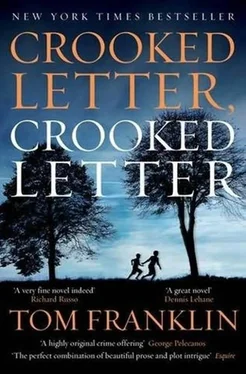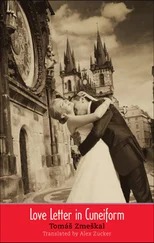The pair of them was standing at the bend in the road by the store, a tall, thin black woman and her son, about Larry’s age, a rabbit of a boy he’d seen at school, a new kid. He wondered what they were doing here, this far out, before the store opened. Despite the cold the boy wore threadbare jeans and a white shirt and his mother a blue dress the wind curved over her figure. She wore a cloth around her hair, breath torn from her lips like tissues snatched from a box.
His father passed without stopping, Larry turning his head to watch the boy and his mother peer at them from outside.
Larry turned. “Daddy?”
“Ah dern,” said his father, jabbing the brakes. He had to back up to meet them, then he leaned past Larry on the truck’s bench seat (an army blanket placed over it by his mother) and rattled the knob and they were in in a burst of freezing air that seemed to swirl even after the woman had shut the door. They were all forced together, Larry against the boy on one side and his father on the other, uncomfortable because he and his father almost never touched, awkward handshakes, whippings. For a moment the four sat as if catching their breath after a disaster, the truck idling. Larry could hear the boy’s teeth clacking.
Then his father said, “Larry, thow a log on that dad-blame fire. Warm these folks up.”
He turned the heater to HI and soon the black boy beside Larry had stopped shivering.
“Alice,” said his father, pulling onto the road, “introduce these younguns.”
“Larry,” the woman said, as if she knew him, “this is Silas. Silas, this is Larry.”
Larry stuck out his calfskin glove. Silas’s slender brown hand was bare, and despite the quick soul shake it gave, Larry felt how cold his skin was. If he gave him one of his gloves, they could each have one warm hand. He wanted to do this, but how?
They smelled like smoke, Silas and his mother, and Larry realized where they must live. His father owned over five hundred acres, much of it in the bottom-right corner of the county, and on the southeast end, a half a mile from the dirt road, if you knew where to look, was an old log hunting cabin centered along with a few trees in a field a few acres across, just a little bump on the land. Bare furnishings inside, dirt floor, no water or electricity. Heated by a woodstove. But when had they moved in? And by what arrangement?
His father and the woman called Alice were talking about how cold it was.
“Freeze my dad-blame can off,” his father said.
“Mm hmm,” she said.
“You ever seen the like?”
“No, sir.”
“Not even in Chicago?”
She didn’t answer, and when the silence became awkward, his father turned the radio up and they listened to the weatherman saying it was cold. It was going to stay cold. Leave your tap water running tonight so your pipes wouldn’t freeze.
Larry stole a look at the boy beside him and then pretended to read his book. He was terrified of black kids. The fall after the summer he turned eleven he had entered the seventh grade. Recent redistricting of county schools had removed him from the public school in Fulsom and forced him to go to the Chabot school, where 80 percent of the student population (and a lot of the teachers and the vice principal) were black, mostly kids of the men who worked in the mill or cut trees or drove log trucks. Everything Larry couldn’t do-spike a volleyball, throw a football or catch one, field a grounder, fire a dodgeball-these black boys could. Did. They manipulated balls as if by magic, basketballs swishing impossibly, baseballs swiped out of the air, fierceeyed boys hurling and curving through their lives as smoothly as boomerangs. None read, though, or understood Larry’s love for books. Now he glanced over and saw Silas’s lips tense and his eyes moving across Larry’s page.
“What grade you in?” Larry asked.
Silas looked at his mother.
“Tell him,” she said.
“Eighth,” he said.
“Me, too.”
In Fulsom his father dropped the boys off at school, Alice climbing out and then Silas, Larry aware how unusual, inappropriate, it was for black people to be getting out of a white man’s truck. As he slid across the seat Larry glanced back at his father, who faced the road. Silas had disappeared-probably as aware as Larry of the oddity of their situation-and Larry stepped past the woman called Alice, seeing for the first time, as she smiled at him, how lovely she was.
“Good-bye,” she said.
“Bye,” he mumbled and walked off with his books. He glanced back, once, and saw his father saying something, the woman shaking her head.
At lunch in the cafeteria he looked for Silas among the black boys who occupied the two center tables but didn’t see him. He had to be careful because if they caught him looking they’d beat him up later. As usual, he sat with his tray and milk a few feet down from a group of white boys. Once in a while they’d invite him over. Not today.
His mother picked him up that afternoon, as usual, and, as usual, quizzed him about his day. She seemed surprised about their morning passengers. She asked where they’d been standing.
“They didn’t have coats,” he said. “They were freezing.”
“Where do they live?” she asked.
He sensed he’d said too much already, though, and said he didn’t know. For the rest of the ride, his mother was quiet.
WHEREVER ALICE AND Silas lived, they were there the next morning, same place, same time. His father pulled the truck over and the smell of woodsmoke blew into the cab with the icy wind and soon they all rode silently side by side. Larry opened Salem’s Lot and held it so that he was sure Silas would notice. It was the best part, where the girl came back as a vampire, floating there at Ben’s window.
Wednesday and Thursday passed, each day the colored people waiting, his mother picking him up in the afternoon and quizzing him on the morning trip. Did the woman seem friendly to his father? How did his father act? Was he stiff, the way he could be, was, most of the time? Or was he-
“Why do you care?” Larry asked.
She didn’t answer.
“Well? Momma?”
“I don’t care,” she said. “I’m just curious about your day.”
“I think,” he said, worried he’d hurt her, “they live in that old place down in the southeast acreage.”
“Do they,” his mother said.
At supper that night he could tell something was wrong. She’d told Larry to feed the chickens when he’d already done it and his father had to be reminded to say the blessing. Now neither of his parents spoke as they sat around their dining table and passed squash and meat loaf. And just before she rose to gather their dishes, his mother announced that she would drive Larry to school the following day, in her car.
His father glanced at Larry. “How come, Ina?”
“Oh,” she said. “In the morning that gas man’s coming and I can’t talk to him. You’ve got to tell him to come every week, every week, and make sure he understands. Besides-” She took the dishes to the sink and returned to the table. “I’ve got some things to return at Bedsole’s.”
His father nodded, then looked at Larry before pushing back from the table and bending into the refrigerator for a Budweiser and opening it on the way to his chair to watch the news.
“Carl?” His mother set a pie plate down, a little hard.
“Enjoyed it,” he called back.
As Larry dried the plates his mother handed him, he understood that he had betrayed a trust between himself and his father, and the next morning, in his mother’s Buick, she turned at the bend in the road where Alice and Silas waited, shivering, holding on to each other. As his mother slowed, Larry saw Silas push away from Alice, just as he would have done. Her drawn face pretty despite how the cold made her lips tiny, her skin the color of coffee the way women drank it, her hair in a scarf but her eyes large and frightened.
Читать дальше












